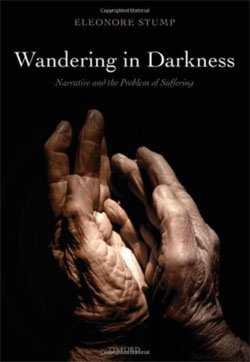Description

Wandering in Darkness: Narrative and the Problem of Suffering (2010)
by Eleonore Stump
668 pages
My Rating: 5 of 5 stars
From the Publisher: Wandering in Darkness first presents the moral psychology and value theory within which one typical traditional theodicy, namely, that of Thomas Aquinas, is embedded. It explicates Aquinas’s account of the good for human beings, including the nature of love and union among persons. Eleonore Stump also makes use of developments in neurobiology and developmental psychology to illuminate the nature of such union.
Stump then turns to an examination of narratives. In a methodological section focused on epistemological issues, the book uses recent research involving autism spectrum disorder to argue that some philosophical problems are best considered in the context of narratives. Using the methodology argued for, the book gives detailed, innovative exegeses of the stories of Job, Samson, Abraham and Isaac, and Mary of Bethany.
In the context of these stories and against the backdrop of Aquinas’s other views, Stump presents Aquinas’s own theodicy, and shows that Aquinas’s theodicy gives a powerful explanation for God’s allowing suffering. She concludes by arguing that this explanation constitutes a consistent and cogent defense for the problem of suffering.
Review
A little over a year ago, I purchased Stump’s book, “Wandering in Darkness.” I made it through the first two parts of this four-part tome before a significant writing project made me close the pages for a time. This book is heavy reading and long; around 480 pages, not counting over 150 pages of endnotes (which I highly recommend reading, as well).
Stump lays the comprehensive groundwork in the first two parts of the book which is essential and makes for wonderful reading. In part 3, Stump interprets four classic biblical stories of suffering, which will be the key to understanding the final conclusion and theodicy. Though God permits all evil and suffering, a perfectly good God would have a morally sufficient reason for allowing both. If suffering is defeated by the benefits that accrue to the persons who suffer, then suffering might lead to an ultimate good. Stump submits that such benefits could represent a sufficient reason for allowing suffering. Of course, the ideal end, and the greatest potential benefit, would be for the sufferer to be forever united in love with God.
Stump’s methodology in dealing with the biblical narrative asks the skeptic to consider (i.e., assume for the sake of argument, or consider provisionally true) a “putatively possible world,” in which the central claims of Christianity are true. This is different from flat out asking her opponents to assume a Christian worldview, but rather seeks their consideration in weighing an argument as a possibility. In other words, she seems to be saying to the unbeliever, “Just try the arguments on for size and let that sink in and perhaps you will change your view.” In my opinion, when Stump sets the stage in this manner, she has much success.
Stump’s demeanor is disarming. She is intelligent and exhibits careful reasoning, and yet she is caring and thoughtful in a way that is not so threatening as many apologists come off. She presents her Christian faith in an articulate and yet sensitively humane way that I have come to appreciate.
I don’t think Stump was out to prove anything. I think she was asking her audience to reconsider biblical stories and simply rethink their interpretation. I find this strategy appealing, especially in light of the fact that the problem of evil and human suffering represents such a difficult issue for the Christian worldview. Anyone who approaches this problem with a cut and dried (i.e., “stock”) answer is likely to suffer a credibility crisis. If one has given much thought to the problem of evil and suffering, it is easy to see that it is as difficult a problem as can be faced by the Christian worldview. It seems to me that the Problem of Evil/Suffering is one of the most virulent and troublesome problems facing Christians in the world today. “Wandering in Darkness,” by Eleonore Stump, is destined to become a classic book on the topic of the Problem of Evil and Suffering.